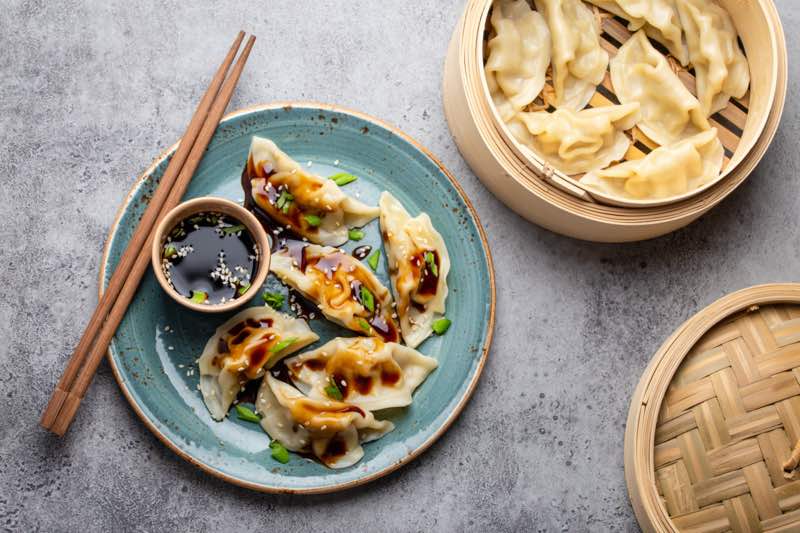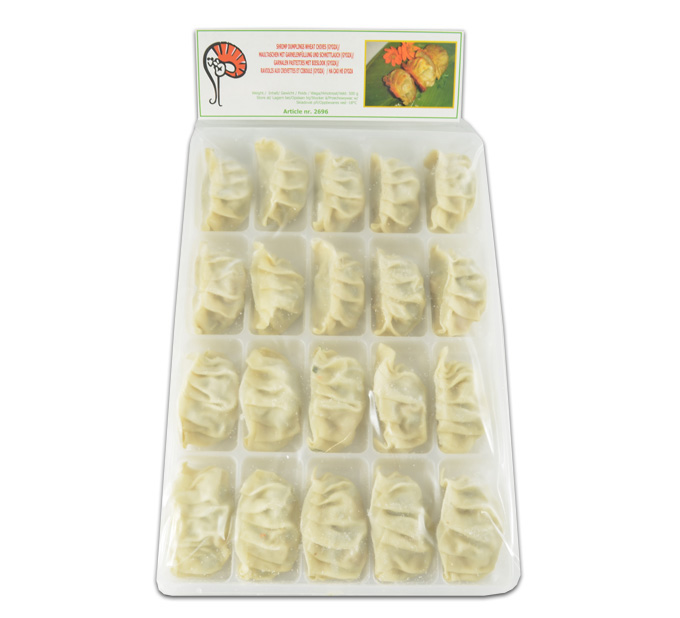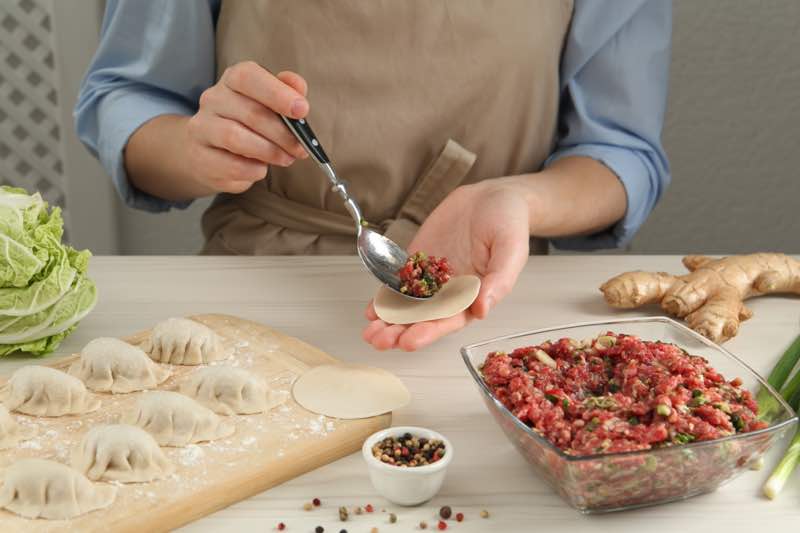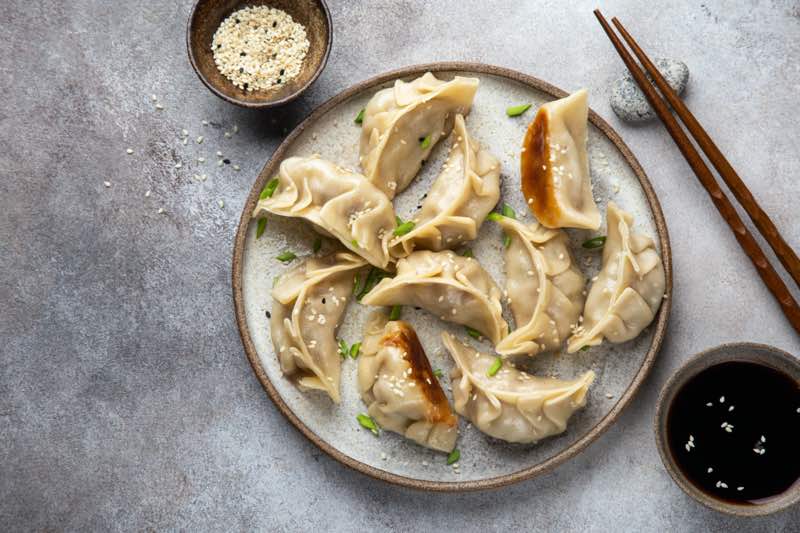Nederlands
English
Deutsch
Français
What are dumplings? Where do dumplings originally come from, and which ones are the most popular? These are three important questions you as a buyer need to know and which this article answers in detail.
Gyoza is a Japanese dumpling belonging to the ‘Dim Sum’ category. Dim Sum products have always been hugely popular in Asia and are also gaining popularity in Europe. Popular Dim Sum products include well-known varieties such as Ha Kau, Sieuw Mai and Gyoza.
As Gyoza is very popular, we dedicate this article to that particular dumpling. Topics covered in this article include:
Gyoza is a delicious dish with an interesting history, and there are many variations. Gyoza (pronounced ‘gjo-zah’) are Japanese dumplings in the famous Asian Dim Sum category. This popular finger food is similar to Spanish tapas and is gaining popularity in the West.
Japanese dumplings are small dough parcels made from wheat flour filled mainly with succulent meat and cabbage. Traditionally, gyoza dumplings are first pan-fried, then steamed until tender and briefly crisped just before they are served.

This Japanese Gyoza dumpling originated in China. The Chinese call the well-known Dim Sum Jiaozi. However, the dish only became popular in Japan around 1940, when Chinese immigrants introduced it to Japanese cuisine during World War II. In Japan, dumplings were first produced in Yokohama, a city with a large Chinese community. From then on, Gyoza’s popularity in Japan spread like wildfire.
Japanese Gyoza and Chinese Jiaozi are not exactly the same. The main difference is the rich garlic flavour, which is much less prominent in the original Chinese version. In addition, the dough wrapper of the Japanese Gyoza is slightly thinner than that of the Chinese Jiaozi, as it is often machine-made. The latter is also why the Japanese filling is usually more finely ground. The thin dough of the Japanese Gyoza results in a delicious crispiness.
You can find Gyoza and Gyoza wrappers, frozen or ready-to-cook, in supermarkets and restaurants all over Japan. Availability of both the dough wrappers and the prepared Gyoza parcels has increased in Asian markets worldwide.
Gyoza Mandu is a Dim Sum that has been gaining popularity recently. So, Gyoza originated in China and later came from Japan, but the South Korean versions, in particular, are currently trending here. At the moment, you can order as many as nine different varieties of South Korean Gyoza at Mooijer-Volendam: Gyoza with shrimp, Gyoza with seafood, the all-time favourite vegetarian Gyoza and many more. Feel free to take a look at our extensive range of Gyoza products.

The most traditional filling for Gyoza consists of minced pork (sometimes beef), cabbage, garlic, ginger and sesame oil. But these days, many varieties of Gyoza are available, both with meat fillings and vegetarian. Shrimp, chicken, mushrooms and/or tofu are also often added to the filling.
The Gyoza dough is made of wheat flour, water, salt, and sometimes added egg. The dough is kneaded and rolled out into small round discs on which the filling is placed − two teaspoons are enough. The dough is then folded into small parcels that are ultimately steamed, boiled or fried.
Ingredients:
Gyoza dough in five easy steps:

Gyoza can be prepared in different ways. The most common methods are steaming, boiling and frying. Gyoza is often steamed in a bamboo steamer basket or boiled in a pan of water, then served in the basket or on a small plate. They are also regularly pan-fried or deep-fried, which gives them a deliciously crispy texture. The best way to prepare Gyoza depends on the filling and your personal preference.
In Japanese restaurants, gyoza is often served as an appetiser, snack or side dish. They are usually combined with soy sauce, rice vinegar and/or ginger, and sometimes with a spicy sauce or some chilli oil. Gyoza can also be served with Shoyu ramen, a Japanese noodle soup.

Basically, there are endless options with Gyoza. And whether you steam them, add them to a soup, boil them, fry or deep-fry them: they are a great addition to any meal. Give it a try and find out for yourself why Gyoza is so popular!
Buying Gyoza at fish wholesaler Mooijer-Volendam
Are you excited and curious about Mooijer-Volendam’s full range of Gyoza products? At Mooijer-Volendam, we have a wide range of Gyoza products: Gyoza with chicken and vegetables, Gyoza with shrimp, vegetarian Gyoza, and many more to choose from.
Gyoza products at Mooijer-Volendam
Discover our complete range of Gyoza products on our website. As a wholesaler to the Asian market, Mooijer-Volendam sets high standards for its quality. Our customers can rely on AAA-product quality, which is what our customers also demand from us.
For this reason, more and more Asian speciality shops turn to us as their wholesaler. Moreover, we also serve as a wholesaler to fish shops, speciality shops and major retailers. Would you also like to experience Mooijer-Volendam quality?